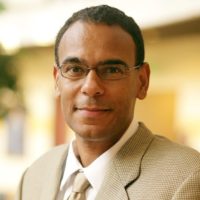
A team of Meharry Medical College students has been accepted to the National Science Foundation Innovation Corps program to continue work on a health-education platform developed through participation in a program offered by Vanderbilt University’s innovation center, the Wondr’y.
This is the first team from Meharry Medical College to be accepted to the I-Corps program, which will begin in Spring 2021.
Vanderbilt’s Ideator program, run through the Wondr’y, works with burgeoning inventors among faculty, students and staff from universities throughout the Southeast. The program provides training, expert mentorship, individual office hours with experienced entrepreneurs and idea evaluation experts, and microgrant funding. The Wond’ry became an I-Corps site in 2017, providing a pathway into the NSF National I-Corps program for STEM-related innovations through training, microgrant funding, application review, interview preparation and proposal resources.
Portia Thomas, a M.D./Ph.D. candidate at Meharry, along with fellow students Zerick Dunbar and James Mungin, both Ph.D. candidates, are the co-founders of Vagiome, a health education platform that engages, equips, educates and empowers individuals of all ethnicities and genders to advocate for their vaginal health. In line with Meharry’s mission “to serve the underserved,” Vagiome prioritizes underserved populations by offering an accessible, user-friendly and gender-inclusive service.
“Evidence-based medicine specific to vaginal care is one of the most undervalued fields of scientific study,” Thomas said. “We envision Vagiome will serve as an aid in building and sustaining a platform that allows individuals to navigate their vaginal health with dignity and accurate knowledge.”
On Dec. 11, the Women’s Business Enterprise National Council announced that Thomas had received a Cummins Grant for Black Student Female Founders. This was the first team from a program run by the Wondr’y to receive WBENC funding.

“Working with innovators on ideas that will change the world is one of the most exciting aspects of the Wond’ry,” said David Owens, Evans Family Executive Director of the Wond’ry and professor of the practice of management and innovation. “We are tremendously proud of Portia, Zerick and James’ work so far and are looking forward to future collaborations with innovators from Meharry Medical College.”
Program participation is freely available to provide the tools needed for customer discovery and evaluation of an idea’s potential in the market. Ideas from all industries are accepted, from consumer products and services to medical devices and deep science discoveries. The next Ideator cohort will begin in February—applications are open.
The NSF I-Corps program supports deep technologies and fundamental discoveries in science and engineering that have high potential to impact society. In the past three years, more than 20 Wond’ry teams have been accepted to this highly competitive NSF program.
In addition to Vagiome, three other Ideator teams have been accepted to the Spring 2021 I-Corps cohort:
- Christina Marasco, associate professor of the practice of biomedical engineering and Stacy Sherrod, research assistant professor of chemistry and executive director of the Center for Innovative Technology, are the co-founders of Finally Skincare, a biotechnology company that provides scientific skin assessment to help guide individuals to the best skincare ingredients for them.
- Elissa LeDoux, former Vanderbilt graduate student and current lecturer in the department of engineering technology and mechatronics engineering at Middle Tennessee State University, is working on her research project, “Handy Helper: 3D Printed Powered Hand Orthosis,” a hand orthosis to support hand motor function recovery for stroke victims.
- Michael Finn-Henry and Olivia Busk, both Vanderbilt undergraduate students mentored at the Wond’ry by Stryker Warren, have developed Resuscitative Endovascular Bypass (REBy), a hemorrhage control device that provides doctors with more time to address hemorrhages, allowing them to save lives.